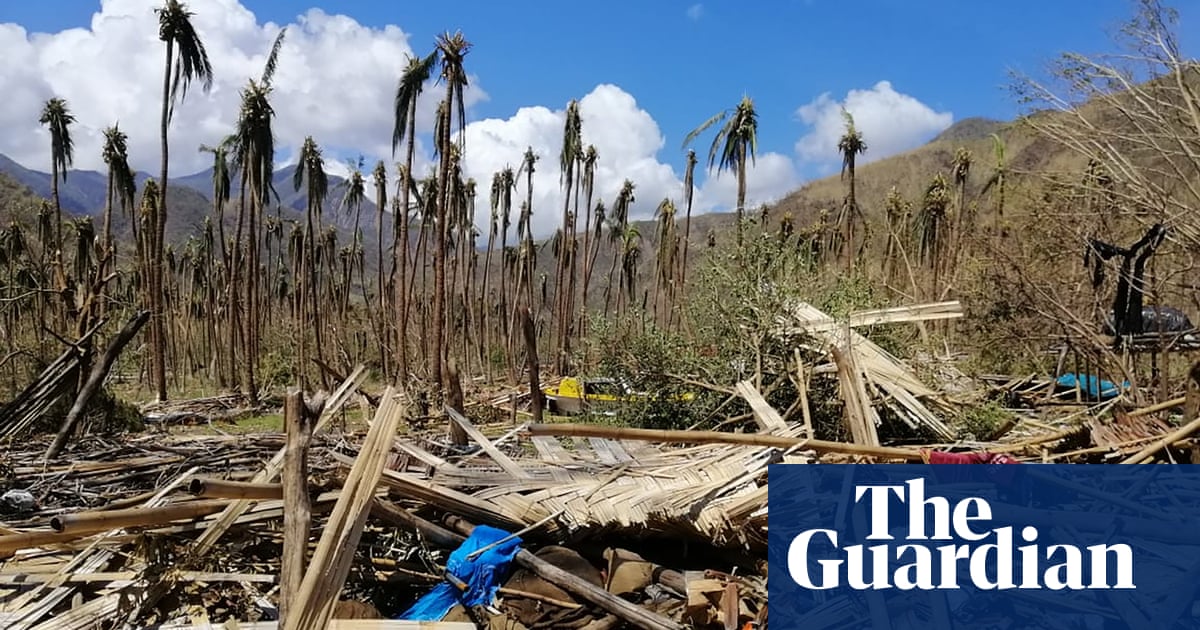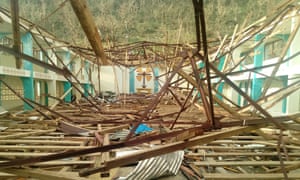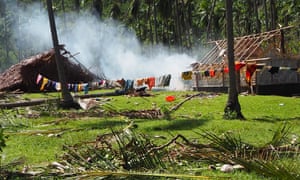Humanitarian supplies flown in by Australian government cant be touched for three days due to strict quarantine rules

The distribution of urgent cyclone relief supplies brought into Vanuatu by the Australian government has been delayed due to coronavirus, potentially endangering lives.
Last week Cyclone Harold hit the northern islands of the Pacific nation of Vanuatu, flattening buildings and killing three people raising the international total to 30.
Following Vanuatus request for international assistance, the Australian government sent an RAAF plane carrying humanitarian relief supplies, such as blankets, lanterns, shelter kits and hygiene kits to the country over the Easter weekend.
The plane was initially turned back because a civilian jet aircraft carrying medical supplies from China to aid with the Pacific nations efforts to combat coronavirus had failed to depart that morning and was blocking the apron.
The Australian plane was able to land Monday and unload supplies, but it will sit in the countrys capital of Port Vila for at least three days in quarantine, due to fears that particles of the virus remain on the materials used to package the relief supplies.
So far Vanuatu has no confirmed cases of Covid-19 and the government has taken strong action to try to prevent an outbreak.
An order under Vanuatus ongoing state of emergency dated 3 April states: Unless otherwise required, all disinfected cargo must be kept in quarantine at least seven days.
It later emerged that the seven-day requirement was reduced to three days for the Australian relief supplies. Although no formal exception was published, local defence officials who facilitated the flight were later able to confirm the shortened quarantine period.

Attempts to discover why the change was made, and whether the seven-day requirement remained in place generally were unsuccessful.
World Health Organization guidelines suggest the virus can live on plastics and other packaging materials for hours or days. It recommends treatment of potentially infected surfaces with common disinfectants.
Dr Christopher Bartlett, an independent climate change expert who was stranded in the remote western part of Espiritu Santo Island by Vanuatus Covid-19 domestic travel ban, has accompanied local government officials in visits to dozens of coastal villages where they have conducted damage assessments.
It was like a nightmare, he said. The entire landscape was transformed.
In one village, he said, two small children emerged from the ruins of their house and asked their parents if theyd been transported to a different land.

Bartlett was able to coordinate with provincial authorities to deal with urgent medical matters. Two children suffered multiple fractures when their house collapsed on them. They had been untreated for days when he found them.
Theres an immediate need for relief, especially for shelter. Hours, days matter. People are sleeping in the ruins, said Bartlett.
Places have changed beyond recognition, said Andrew Gray, a secondary school science teacher on Pentecost Island. In the short term, food is rotting in gardens because paths everywhere are blocked by fallen trees. In the medium-term people know that the government will send aid.
Additional quarantine restrictions have created a lag in a response where conditions in affected areas are the worst in living memory.
Covid-19 seems to have dried up charitable donations, too. Within 72 hours of [Cyclone] Pam, we had AU$7m [in donations], said World Vision country manager Kendra Gates Derousseau. If we crest $1m at the end of this week, well have done a good job.
Caretaker deputy prime minister Jotham Napat, who was chair of the national disaster committee during Cyclone Pam, has repeatedly expressed concern that delays could cost lives. Assistance is needed, and urgently, he wrote on Facebook last week.
We need logistics, food and shelter, and we know and are grateful for our friends and neighbours who have already committed much needed support.
Days later when a third death was reported, he struck out, writing Another life lost … please advise as to why we are unable to save this life. Was it because we were too slow to act? We need some explanation or I will ask the director and [director general] NDMO to voluntarily resign or we will find a way to remove them for incompetence.


Recent Comments